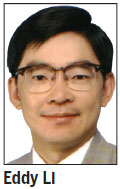No justifications remain for Occupy Central
Updated: 2014-06-09 07:10
By Eddy Li(HK Edition)
|
|||||||
Secretary for Security Lai Tung-kwok recently delivered a lecture on the "Occupy Central" campaign at the Hong Kong Chinese Importers' and Exporters' Association. He discussed whether the movement was illegal or not, and addressed the question of the possibility that the government will issue the campaign with a Letter of No Objection (LONO).
As far as I am concerned, the answer is quite obvious. Benny Tai Yiu-ting, instigator of the campaign in January last year, published an article in which he clearly stated that the Occupy Central movement wants demonstrators to block thoroughfares in Central over a sustained period, with the intention of forcing the government to deliver what it considers an acceptable proposal on universal suffrage. This would mean paralyzing Hong Kong's political and economic center. The campaign hopes to enlist over 10,000 people to block traffic in Central and make the police forcibly remove them. In Tai's article, he also wrote that "civil disobedience is illegal" - and required all participants to sign an affidavit assuming any legal liability arising from their own actions.
In terms of the law, the Hong Kong Public Order Ordinance stipulates that any public meeting of more than 50 people, and a public procession of more than 30, must give a notice to the Commissioner of Police (CP) not less than seven days prior to the intended event. This can only be conducted if the CP issues an LONO to the organizers.

This means the illegality of Occupy Central is now beyond dispute. In fact, its organizers and supporters are well aware of this. Because of its illegality, Occupy Central has always faced strong opposition from the majority of Hongkongers. There is no question the police and the government are against it.
The rule of law, as we all know, is one of the core values vital to Hong Kong's success. Occupy Central, however, is an attempt to incite mass violation of existing laws to satisfy the organizers' political ambitions. Hong Kong's social stability will be seriously jeopardized if this happens.
I've always considered freedoms - freedom of expression, freedom of religion, and the freedom to live peacefully - the most valuable aspects of Hong Kong. But these freedoms should be enjoyed in accordance with one basic principle - no one should exercise their own rights at the expense of other people's rights.
Every Hong Kong resident is entitled to express their views on constitutional development and universal suffrage. But they must not interfere with other peoples' rights to take a public route for their own choices any time they like. Occupy Central intends to do precisely this. Imagine if a student felt dissatisfied with a teacher's classroom style. Is it fair for him to disrupt the class at the expense of the other students? We all know the answer is "No".
The advocates of Occupy Central claim that they will only break the law in order to promote democracy. But basic principles of democracy include majority rule and respect for the law. The initiator of the campaign has, himself, admitted it is illegal. So people have every right to oppose it - no matter what excuses the organizers may use to justify their actions. Not long ago, a public opinion poll found that only about 30 percent of respondents supported the illegal movement. Most were worried it would lead to violence. If the organizers of Occupy Central really valued public opinion they should already have abandoned their illegal campaign. This would have shown respect to the spirit of democracy.
So there is no way they can now justify the campaign to the very people whose individual rights they will be jeopardizing.
The author is vice-president of the Chinese Manufacturers' Association of Hong Kong.
(HK Edition 06/09/2014 page1)